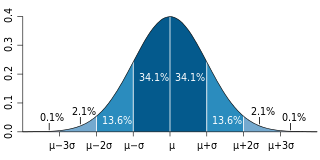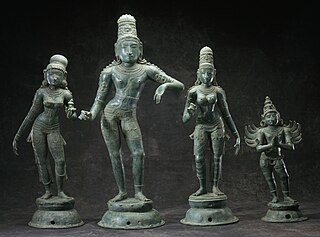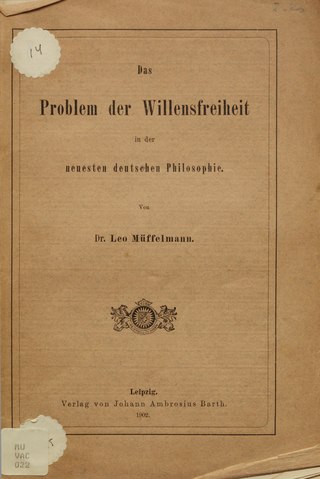
Karma is a concept of action, work, or deed, and its effect or consequences. In Indian religions, the term more specifically refers to a principle of cause and effect, often descriptively called the principle of karma, wherein individuals' intent and actions (cause) influence their future (effect): Good intent and good deeds contribute to good karma and happier rebirths, while bad intent and bad deeds contribute to bad karma and bad rebirths. In some scriptures, however, there is no link between rebirth and karma. Karma is often misunderstood as fate, destiny, or predetermination.

Free will is the capacity or ability to choose between different possible courses of action.

Determinism is the philosophical view that all events in the universe, including human decisions and actions, are causally inevitable. Deterministic theories throughout the history of philosophy have developed from diverse and sometimes overlapping motives and considerations. Like eternalism, determinism focuses on particular events rather than the future as a concept. The opposite of determinism is indeterminism, or the view that events are not deterministically caused but rather occur due to chance. Determinism is often contrasted with free will, although some philosophers claim that the two are compatible.
Eastern philosophy or Asian philosophy includes the various philosophies that originated in East and South Asia, including Chinese philosophy, Japanese philosophy, Korean philosophy, and Vietnamese philosophy; which are dominant in East Asia, and Indian philosophy, which are dominant in South Asia, Southeast Asia, Tibet, and Mongolia.

Saṃsāra is a Pali and Sanskrit word that means "wandering" as well as "world," wherein the term connotes "cyclic change" or, less formally, "running around in circles." Saṃsāra is referred to with terms or phrases such as transmigration/reincarnation, karmic cycle, or Punarjanman, and "cycle of aimless drifting, wandering or mundane existence". When related to the theory of karma it is the cycle of death and rebirth.
The argument from free will, also called the paradox of free will or theological fatalism, contends that omniscience and free will are incompatible and that any conception of God that incorporates both properties is therefore inconceivable. See the various controversies over claims of God's omniscience, in particular the critical notion of foreknowledge. These arguments are deeply concerned with the implications of predestination.

Indian philosophy consists of philosophical traditions of the Indian subcontinent. A traditional Hindu classification divides āstika and nāstika schools of philosophy, depending on one of three alternate criteria: whether it believes the Vedas as a valid source of knowledge; whether the school believes in the premises of Brahman and Atman; and whether the school believes in afterlife and Devas.
Destiny, sometimes also called fate, is a predetermined course of events. It may be conceived as a predetermined future, whether in general or of an individual.
Predeterminism is the philosophy that all events of history, past, present and future, have been already decided or are already known, including human actions.

Ajivika is one of the nāstika or "heterodox" schools of Indian philosophy. Believed to have been founded in the 5th century BCE by Makkhali Gosāla, it was a Śramaṇa movement and a major rival of Vedic religion, early Buddhism, and Jainism. Ājīvikas were organized renunciates who formed discrete communities. The precise identity of the Ājīvikas is not well known, and it is even unclear if they were a divergent sect of the Buddhists or the Jains.
The lazy argument or idle argument is an attempt to undermine the philosophical doctrine of fatalism by demonstrating that, if everything that happens is determined by fate, it is futile to take any kind of action. Its basic form is that of a complex constructive dilemma.

A śramaṇa or samaṇa is a person "who labours, toils, or exerts themselves for some higher or religious purpose" or "seeker, one who performs acts of austerity, ascetic". During its development, the term came to refer to several non-Brahmanical ascetic religious movements parallel to but separate from the Vedic religion's. The Śramaṇa tradition includes primarily Jainism, Buddhism, and others such as the Ājīvika.
Theological determinism is a form of predeterminism which states that all events that happen are pre-ordained, and/or predestined to happen, by one or more divine beings, or that they are destined to occur given the divine beings' omniscience. Theological determinism exists in a number of religions, including Jainism, Judaism, Christianity, and Islam. It is also supported by proponents of Classical pantheism such as the Stoics and by philosophers such as Baruch Spinoza.

Future contingent propositions are statements about states of affairs in the future that are contingent: neither necessarily true nor necessarily false.
Free will in theology is an important part of the debate on free will in general. Religions vary greatly in their response to the standard argument against free will and thus might appeal to any number of responses to the paradox of free will, the claim that omniscience and free will are incompatible.

Makkhali Gosala or Manthaliputra Goshalak was an ascetic ajivika teacher of ancient India. He was a contemporary of Gautama Buddha, the founder of Buddhism, and of Mahavira, the last and 24th Tirthankara of Jainism.

Hinduism, in particular Vaishnavism and Shaivism, was the predominant religion in ancient Tamilakam. The Sangam period in Tamilakam was characterized by the coexistence of many denominations and religions: Vaishnavism, Shaivism, Ajivika and later joined by Buddhism and Jainism alongside the folk religion of the Tamil people. The monarchs of the time practiced religious tolerance and openly encouraged religious discussions and invited teachers of every sect to the public halls to preach their doctrines. Hinduism, Jainism, and Buddhism were the three major religions that prevailed in the Tamil region predating the Common Era, as early as the Sangam period.
In logic, contingency is the feature of a statement making it neither necessary nor impossible. Contingency is a fundamental concept of modal logic. Modal logic concerns the manner, or mode, in which statements are true. Contingency is one of three basic modes alongside necessity and possibility. In modal logic, a contingent statement stands in the modal realm between what is necessary and what is impossible, never crossing into the territory of either status. Contingent and necessary statements form the complete set of possible statements. While this definition is widely accepted, the precise distinction between what is contingent and what is necessary has been challenged since antiquity.
Free will in antiquity is a philosophical and theological concept. Free will in antiquity was not discussed in the same terms as used in the modern free will debates, but historians of the problem have speculated who exactly was first to take positions as determinist, libertarian, and compatibilist in antiquity. There is wide agreement that these views were essentially fully formed over 2000 years ago. Candidates for the first thinkers to form these views, as well as the idea of a non-physical "agent-causal" libertarianism, include Democritus, Aristotle, Epicurus, Chrysippus, and Carneades.

Das Problem der Willensfreiheit in der neuesten deutschen Philosophie is a book written by Dr. Leopold Müffelmann and published in Leipzig in 1902. It is the dissertation of Dr. Leopold Müffelmann who was a jurist and chief executive of the lodge of the Freemason, and summarizes historical viewpoints on the topic of free will with a focus on the common opinion within German philosophy in the early 20th century. The book considers the general ideas towards the problem, namely indeterminism, fatalism and determinism. Müffelmann treats the subject of free will rather objectively, however, it becomes apparent that his view towards the problem of free will is deterministic. In the dissertation Müffelmann argues, that the problem of free will is actually not as important as often claimed by philosophers and that ethical life and thought should not be made dependent upon it.










